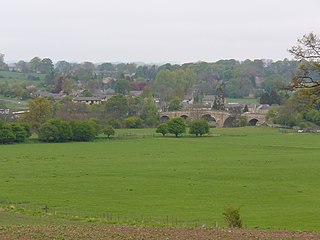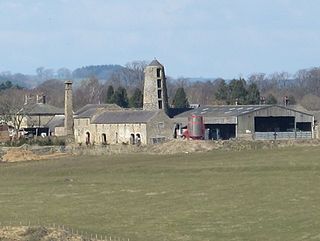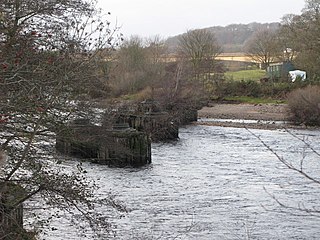Charlton is a village in Northumberland, England. It is about 1.5 miles (2.4 km) to the northwest of Bellingham, on the River North Tyne.
Charlton is a village in Northumberland, England. It is about 1.5 miles (2.4 km) to the northwest of Bellingham, on the River North Tyne.
Charlton is in the parliamentary constituency of Hexham.
Charlton was served by Charlton railway station on the Border Counties Railway which linked the Newcastle and Carlisle Railway, near Hexham, with the Border Union Railway at Riccarton Junction. The first section of the route was opened between Hexham and Chollerford in 1858, the remainder opening in 1862. [1] The line was closed to passengers by British Railways in 1956. Part of the line is now beneath the surface of Kielder Water.

Hexham is a market town and civil parish in Northumberland, England, on the south bank of the River Tyne, formed by the confluence of the North Tyne and the South Tyne at Warden nearby, and close to Hadrian's Wall. Hexham was the administrative centre for the Tynedale district from 1974 to 2009. In 2011, it had a population of 13,097.

Barrasford is a village in Northumberland, England. It is situated to the north of Hexham, on the North Tyne. Barrasford is an ancient village that lies within the shadow of Haughton Castle. The village is notable for being the location of a Bronze Age burial site where the Reaverhill Dagger was excavated in 1964. Today Barrasford is noted for its quarry.

Chollerford is a village in Northumberland, England, approximately four miles north of Hexham on the B6318, the Military Road, not far from Hadrian's Wall. There is a roundabout in the village where the B6318 and B6320 roads meet and the traffic light-controlled Chollerford Bridge crosses the River North Tyne. Beside the river is The George Hotel.

Chollerton is a village in Northumberland, England, on the A6079 road about six miles (10 km) to the north of Hexham, on the River North Tyne. Nearby villages include Low Brunton and Humshaugh. The village has a fine example of a mounting block standing at the churchyard gate.

Wark on Tyne is a small village and civil parish in Northumberland, England, 12 miles (19 km) north of Hexham.

Hexham is a railway station on the Tyne Valley Line, which runs between Newcastle and Carlisle via Hexham. The station, situated 22 miles 22 chains west of Newcastle, serves the market town of Hexham in Northumberland, England. It is owned by Network Rail and managed by Northern Trains.

Falstone is a small village in Northumberland, England, just east of Kielder Water. The village is 8 miles (13 km) from the Anglo–Scottish border. The name Falstone means "speckled stone". Much of the village is clustered around its two churches, St. Peter's Anglican and the United Reformed Church.

Wall is a village in Northumberland, England situated to the north of Hexham close by the River North Tyne and Hadrian's Wall. The Battle of Heavenfield was fought nearby. The village has one pub and a garage.
Redesmouth is a village in Northumberland, England, just over 1 mile (1.6 km) to the south-east of Bellingham.
The Border Counties Railway was a railway line connecting Hexham in Northumberland, with Riccarton Junction on the Waverley Route in Roxburghshire.

Riccarton Junction, in the county of Roxburghshire in the Scottish Borders, was a railway village and station. In its heyday it had 118 residents and its own school, post office and grocery store. The station was an interchange between the Border Counties Railway branch to Hexham and the North British Railway's (NBR's) Border Union Railway.
Thorneyburn is a village and former civil parish, now in the parish of Tarset, in Northumberland, England, to the northwest of Bellingham. In 1951 the parish had a population of 74.

Deadwater is a small settlement in Northumberland, England, about 3 miles (5 km) north west of Kielder, Northumberland, on the English side of the border between Scotland and England. It is regarded as the source of the River North Tyne, which merges with the River South Tyne near Hexham, and continues around 93 miles/150 km to the North Sea.

Border Counties Bridge was a 19th-century railway bridge across the River Tyne just west of Hexham, Northumberland, England. The bridge used to carry the Border Counties Railway over the River Tyne at Border Counties Junction with the Newcastle and Carlisle Railway.

The Tyne Valley Line is a 58-mile (93 km) route, linking Newcastle upon Tyne with Hexham and Carlisle. The line follows the course of the River Tyne through Tyne and Wear and Northumberland. Five stations and two viaducts on the route are listed structures.

Falstone railway station is a former railway station that served the hamlet of Falstone, in Northumberland, England.
Lewiefield Halt was a wooden-built halt that served the hamlet of Lewie, and a Ministry of Labour training camp, in Northumberland, England.
Kielder railway station is a closed railway station that served the village hamlet of Kielder, Northumberland.

Deadwater railway station is a closed railway station situated on the border between England and Scotland at the head of the North Tyne River. The station served the settlement of Deadwater which consisted of just six houses.
The Hexham and Allendale Railway was a railway company formed in 1865 to build a branch line from the lead mining district of Allendale in Northumberland to a junction near Hexham on the Carlisle to Newcastle line. It opened to goods and mineral traffic in two stages from 1867, and to passengers in 1869.